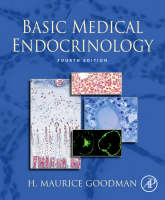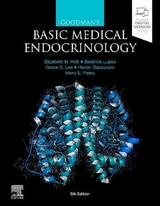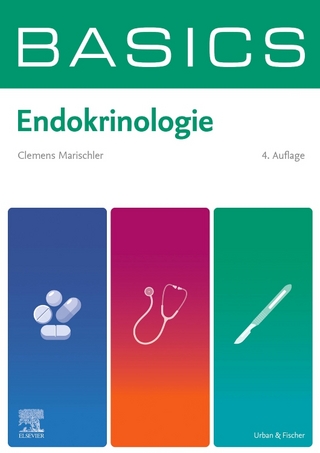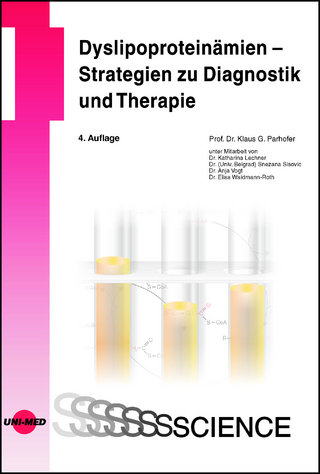
Basic Medical Endocrinology
Academic Press Inc (Verlag)
978-0-12-373975-9 (ISBN)
- Titel ist leider vergriffen;
keine Neuauflage - Artikel merken
Basic Medical Endocrinology, Fourth Edition provides up-to-date coverage of rapidly unfolding advances in the understanding of hormones involved in regulating most aspects of bodily functions. Topics are approached from the perspective of a physiologist with over 40 years of teaching experience.
This fourth edition is richly illustrated in full color with both descriptive schematic diagrams and laboratory findings obtained in clinical studies. Each of the fourteen chapters starts with an overview of the topic and ends with a Suggested Reading list. Initial chapters lay a foundation by presenting basic information and principles of hormone structure, secretion, and actions, and the physiological roles of the principal endocrine glands. Subsequent chapters address the role of the endocrine system in solving such physiological problems as the regulation of the volume and composition of body fluids in the face of changing environmental demands, and the regulation of short- and long-term energy balance. The final chapters deal with the indispensable role of hormones in growth, development and reproduction.
Dr. Holt is the co-director of the Yale Endocrine Neoplasia Group; past president of the Connecticut Endocrine Society; and has been recognized many times as a top doctor by Connecticut magazine. Dr. Peery is a professor who has taught medical and graduate students at the Cumming School of Medicine at the University of Calgary as well as at professional schools in other universities in the United States and Canada. In addition, he is an Affiliate Assistant Professor in the Department of Bioengineering at the School of Medicine at the University of Washington, Seattle. He received his Bachelor of Science degree from Syracuse University, his MSc from Ohio State University, and his PhD from the University of Saskatchewan. At the University of Calgary, he is a member of the Department of Biochemistry and Molecular Biology and is an Associate Member of the Arnie Charbonneau Cancer Research Institute. He currently works in the lab of Dr. Karl Riabowol in the Cumming School of Medicine where he focuses his research on the pathogenesis of anti-NMDA receptor encephalitis, cancer biomarkers, and glioblastoma. He is one of the founding directors of The Anti-NMDA Receptor Encephalitis Foundation, Inc., headquartered in Ottawa, Ontario, Canada.
Chapter 1 Introduction
Biosynthesis of Hormones
Storage and Secretion
Hormones in Blood
Hormone Degradation
Mechanisms of Hormone Action
Specificity
Characteristics of Receptors
Hormonal Actions Mediated by Intracellular Receptors
Hormonal Actions Mediated by Surface Receptors
The G-protein Coupled Receptors
Receptors that Signal through Tyrosine Kinase
Regulation of Hormone Secretion
Negative Feedback
Positive Feedback
Feed Forward
Measurement of Hormones
Immunoassays
Hormone Levels in Blood
Suggested Reading
Chapter 2 Pituitary Gland
Morphology
Physiology of the Anterior Pituitary Gland
Glycoprotein Hormones
Growth Hormone and Prolactin
Adrenocorticotropin Family
Development of the Anterior Pituitary Gland
Regulation of Anterior Pituitary Function
Hypophysiotropic Hormones
Thyrotropin Releasing Hormone (TRH)
Gonadotropin Releasing Hormone
Control of GH Secretion
Corticotropin Releasing Hormone
Dopamine and control of Prolactin Secretion
Secretion and Actions of Hypophysiotropic Hormones
Feedback Control of Anterior Pituitary Function
Physiology of the Posterior
Pituitary
Regulation of Posterior Pituitary Function
Suggested Reading
Chapter 3 Thyroid Gland
Morphology
Thyroid Hormones
Biosynthesis
Iodine Trapping
Thyroglobulin Synthesis
Incorporation of Iodine
Hormone Storage
Secretion
Control of Thyroid Function
Effects of Thyroid-Stimulating Hormone
Effects of the Thyroid-Stimulating Immunoglobulins
Autoregulation of Thyroid Hormone Synthesis
Thyroid Hormones in Blood
Metabolism of Thyroid Hormones
Physiological Effects of Thyroid Hormones
Growth and Maturation
Skeletal System
Central Nervous System
AUTONOMIC NERVOUS SYSTEM
CARDIOVASCULAR SYSTEM
METABOLISM
Oxidative Metabolism and Thermogenesis
Carbohydrate Metaboliism
Lipid Metabolism
Nitrogen Metabolism
Regulation of Thyroid Hormone Secretion
Mechanism of Thyroid Hormone Action
Suggested Reading
Chapter 4 Adrenal Glands
Morphology
Adrenal Cortex
Adrenocortical Hormones
Control of Adrenocortical Hormone Synthesis
Adrenal Steroid Hormones in Blood
Postsecretory Metabolism of Adrenal Cortical Hormones
Physiology of the Mineralocorticoids
Effects of Aldosterone on the Kidney
Regulation of Aldosterone Secretion
Physiology of the Glucocorticoids
Effects on Energy Metabolism
Effects on Water Balance
Effects on Lung DevelopmentGlucocorticoids and Responses to Injury
Adrenocortical Function during Stress
Mechanism of Action of Glucocorticoids
Regulation of Glucocorticoid Secretion
Adrenal Medulla
Biosynthesis of the Medullary Catecholamines
Storage, Release, and Metabolism of Medullary Hormones
Physiological Actions of Medullary Hormones
Regulation Of Adrenal Medullary Function
Suggested Reading
Chapter 5 Principles of Hormonal Integration
Integration of Hormonal Signals at the Cellular and Molecular Level
Augmentation, Antagonism, and Synergy
Permissiveness
Maintaining Signal Fidelity
Modulation of Responding Systems
Sensitivity and Capacity
Spare Receptors
Hormonal Integration at the Whole Animal Level
Redundancy
Reinforcement
Push-Pull Mechanisms
Chapter 6 Hormones of the Gastrointestinal Tract
Functional Anatomy of the GI Tract
Overview of Digestion and Absorption
Hormones of the Gastrointestinal Tract
The Gastrin/Cholecystokinin Family
Physiological Actions of Gastrin
Regulation of Gastrin Secretion
Cholecystokinin (CCK)
The Secretin/Glucagon Superfamily
Secretin 114
GIP (Glucose-dependent Insulinotropic Polypeptide/Gastric Inhibitory Peptide)
Glucagon-like Peptides 1 and 2 (GLP-1 and GLP-2)
The Pancreatic Polypeptide Family
Neurotensin
The Motilin/Ghrelin Family
Concluding Comments
Suggested Reading
Chapter 7 The Pancreatic Islets
Morphology of the Endocrine Pancreas
Glucagon
Biosynthesis, Secretion, and Metabolism
Physiological Actions of Glucagon
Glucose Production
Glycogenolysis
Gluconeogenesis
Lipogenesis and Ketogenesis
Ureogenesis
Regulation of Glucagon Secretion
Insulin
Biosynthesis, Secretion, and Metabolism
Physiological Actions of Insulin
Effects of Insulin Deficiency
Effects on Adipose Tissue
Effects on Muscle 138
Effects on Liver
Mechanism of Insulin Action
Regulation of Insulin Secretion
Glucose
Other Circulating Metabolites
Hormonal and Neural Control
Cellular Events
Somatostatin
Suggested Reading
Chapter 8 Hormonal Regulation of Fuel Metabolism
General Features of Energy Metabolism
Body Fuels
Glucose
Glycogen
Protein
Fat
Problems Inherent in the Use of Glucose and Fat as Metabolic Fuels
Fuel Consumption
The Glucose Fatty Acid Cycle
AMP Activated Kinase (AMPK)
Overall Regulation of Blood Glucose Concentration
Short-term Regulation
Long-term Regulation
Integrated Actions of Metabolic Hormones
Adipose Issue
Muscle
Liver
Pancreatic Islets
Regulation of Metabolism during Feeding and Fasting
Postprandial Period
Postabsorptive Period
Fasting
Hormonal Interactions during Exercise
Short-Term Maximal Effort
Sustained Aerobic Exercise
Long-term Regulation of Fuel Storage
Adipogenesis
Hypothalamic Control of Appetite and Food Intake
Peripheral Input to Hypothalamic Feeding and Satiety Neurons
Adiposity Signals
Leptin
Insulin as an Adiposity Signal
Adipokines
Satiety Signals
Perspective
Suggested Reading
Chapter 9 Regulation of Salt and Water Balance
General Considerations
Salt and Water Balance
Antidiuretic Hormone (ADH)
Antidiuretic Effect
Effects on Blood Pressure
Regulation of ADH Secretion
Plasma Osmolality
Blood Volume
Dysfunctional States
The Renin-Angiotensin-Aldosterone System
Actions of Angiotensin II
Actions on the Adrenal Cortex
Actions on the Kidney
Cardiovascular Effects
Central Nervous System Effects
Regulation of the Renin-Angiotensin-Aldosterone System
Atrial Natriuretic Factor (ANF)
Physiological Actions
Cardiovascular Actions
Renal Actions
Effects on Aldosterone Secretion
Other Effects
Regulation of ANF Secretion
Integrated Compensatory Responses to Changes in Salt and Water Balance
Hemorrhage
Response of the Renin Angiotensin System
Response of the ADH System
Response of Aldosterone
Response of ANF
Dehydration
Salt Loading and Depletion
Suggested Reading
Chapter 10 Hormonal Regulation of Calcium Balance
General Features of Calcium Balance
Distribution of Calcium in the Body
Calcium Balance
Intestinal Absorption
Bone
Kidney
Phosphorus Balance
Parathyroid Glands and Parathyroid Hormone (PTH)
Biosynthesis, Storage, and Secretion of PTH
Mechanisms of Parathyroid Hormone Action
Physiological Actions Of PTH
Actions on Bone
Actions on Kidney
Effects on Intestinal Absorption
PTH Fragments
Parathyroid Hormone-Related Peptide (PTHRP)
Regulation Of PTH Secretion
Calcitonin
Cells of Origin
Biosynthesis, Secretion, and Metabolism
Physiological Actions of Calcitonin
Actions on Bone
Actions on Kidney
Regulation of Secretion
The Vitamin D-Endocrine System
Synthesis and Metabolism
Physiological Actions of 1,25(OH)2D3
Actions on Intestine
Actions on Bone
Actions on Kidney
Actions on Parathyroid Glands
Regulation Of 1,25(OH)2D3 Production
Calcium Regulation of Plasma Calcium Concentrations
Integrated Actions of Calcitropic Hormones
Response to a Hypocalcemic Challenge
Response to a Hypercalcemic Challenge
Other Hormones That Influence Calcium Balance
Suggested Reading
Chapter 11 Hormonal Control of Growth
Growth Hormone
Synthesis, Secretion, and Metabolism
Mode of Action
Physiological Actions of Growth Hormone
Effects on Skeletal Growth
Effects of GH/IGF-I on Body Composition
Regulation of GH Secretion
Effects of Age
Regulators of GH Secretion
Actions Of GHRH, Somatostatin, IGF-I, and GH Relin on the Somatotrope
Thyroid Hormones
Dependence of GH Synthesis and Secretion on T3
Importance of T3 for Expression Of GH Actions
Insulin
Gonadal Hormones
Effects of Estrogens on Epiphyseal Growth Plates
Effects on Growth Hormone Secretion and Action
Effects of Androgens
Glucocorticoids
Suggested Reading
Chapter 12 Hormonal Control of Reproduction in the Male
Morphology of the Testes
Leydig Cells and Seminiferous Tubules
Male Reproductive Tract
Control of Testicular Function
Leydig Cells
Germinal Epithelium
Testosterone
Secretion and Metabolism
Mechanism of Action
Effects on the Male Genital Tract
Effects on Secondary Sexual Characteristics
Sexual Differentiation
Development of Internal Reproductive Ducts and Their Derivatives
Development of the External Genitalia
Testicular Descent into the Scrotum
Postnatal Development
Anomalies of Sexual Differentiation
Regulation of Testicular Function
Gonadotropin Releasing Hormone and the Hypothalamic Pulse Generator
Negative Feedback Regulators
Inhibin and Testosterone
Prepuberty
Puberty
Suggested Reading
Chapter 13 Hormonal Control of Reproduction in the Female: The Menstrual Cycle
Female Reproductive Tract
Ovaries
Folliculogenesis
Oviducts and Uterus
Ovarian Hormones
Estrogens
Progesterone Inhibin
Relaxin
Control of Ovarian Function
Effects of FSH and LH on the Developing Follicle
Estradiol Production
Follicular Development
Cellular Actions of FSH and LH
Effects on Ovulation
Effects on Corpus Luteum Formation
Effects on Oocyte Maturation
Effects on Corpus Luteal Function
Effects on Ovarian Blood Flow
Physiological Actions of Ovarian Steroid Hormones
Effects on the Reproductive Tract
Menstruation
Effects on the Mammary Glands
Other Effects of Ovarian Hormones
Mechanism of Action
Regulation of the Reproductive Cycle
Pattern of Hormones in Blood during the Ovarian Cycle
Regulation Of FSH And LH Secretion
Negative Feedback Aspects
Selection of the Dominant Follicle
Positive Feedback Aspects
Neural Control of Gonadotropin Secretion
Sites of Feedback Control
Timing of Reproductive Cycles
Suggested Reading
Chapter 14 Hormonal Control of Pregnancy and Lactation
Fertilization and Implantation
Gamete Transport
Role of the Oviducts
Implantation and the Formation of the Placenta
The Placenta
Placental Hormones
Human Chorionic Gonadotropin (HCG)
Human Chorionic Somatomammotropin (HCS)
Progesterone
Estrogens
The Role of the Fetal Adrenal Cortex
The Role of Progesterone and Estrogens in Sustaining Pregnancy
Maternal Adaptations to Pregnancy
Cardiovascular Adaptations
Renal Adaptations
Osmoregulation and Thirst
Respiratory Adjustments
Gas Exchange
Metabolic Adjustments
Calcium Balance
Parturition
The Role of Corticotropin Releasing Hormone (CRH)
The Role of Oxytocin
Lactation
Growth and Development of the Mammary Glands
Milk Production
Lactation and Maternal Calcium Balance
Mechanism of Prolactin Action
Neuroendocrine Mechanisms
Milk Let-Down Reflex
Cellular Actions of Oxytocin
Control of Prolactin Secretion
Cellular Regulation of Prolactin Secretion
Prolactin in Blood
Lactation and Resumption of Ovarian Cycles
Suggested Reading
Index
| Erscheint lt. Verlag | 15.8.2008 |
|---|---|
| Verlagsort | San Diego |
| Sprache | englisch |
| Maße | 216 x 276 mm |
| Gewicht | 1197 g |
| Themenwelt | Medizinische Fachgebiete ► Innere Medizin ► Endokrinologie |
| Studium ► 1. Studienabschnitt (Vorklinik) ► Physiologie | |
| ISBN-10 | 0-12-373975-6 / 0123739756 |
| ISBN-13 | 978-0-12-373975-9 / 9780123739759 |
| Zustand | Neuware |
| Informationen gemäß Produktsicherheitsverordnung (GPSR) | |
| Haben Sie eine Frage zum Produkt? |
aus dem Bereich



